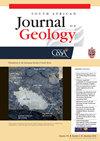南非纳马夸兰德瓦尔普茨放射性废物处置设施所在地的地貌学和新构造学:古地震学和地球动力学影响
IF 1.2
4区 地球科学
Q2 GEOLOGY
引用次数: 0
摘要
放射性废品的安全处置仍然是一个具有挑战性和争议性的问题,但将其掩埋在稳定的地质环境中是大多数国家所青睐的选择。过去对南非半干旱布什曼兰高原瓦尔普茨设施的调查表明,该设施适合处理低放射性、短寿命(小于 300 年)的废料,但同时也表明,需要更多有关危险地震构造和气候过程的数据,以潜在地储存寿命较长的乏核燃料。我们回顾了布什曼兰高原的区域地貌和形态构造特征,然后提供了有关这些特征的新信息,重点是过去二十年挖掘的沟槽中的成土特征和压缩剪切断裂。这些断裂的临时年代介于约 75 ka 和约 46 ka 之间,类似于水平位移有限(≤1 米)的东倾推力断层,并在 4 米深处消亡。最有可能的候选断层是桑塔布断层带(SFZ),其走向长度≥20 千米,在距离瓦尔普茨遗址最近处(8 千米)的走向可达 5 米。布什曼兰高原的区域遥感和非现场调查将瓦尔普茨及其周边地区的新构造事件与纳马夸兰德震源区的晚更新世高潮联系起来。该区的特点是韦格纳应力异常,这是一种长期存在的~西北-东南向压缩,在晚山顿时期达到顶峰,不仅在布什曼兰和纳米比亚中南部部分地区造成了大规模的褶皱和推力,而且还席卷了整个非洲板块。本文章由计算机程序翻译,如有差异,请以英文原文为准。
The geomorphology and neotectonics of the Vaalputs Radioactive Waste Disposal Facility site, Namaqualand, South Africa: Palaeoseismological and geodynamic implications
The safe disposal of radioactive waste products remains a challenging and controversial issue, yet their burial in a stable geological environment is the option favoured by most countries. Past investigations of the Vaalputs facility in South Africa’s semi-arid Bushmanland Plateau demonstrated its suitability for the disposal of low-level, short-lived (<300 years) radioactive waste, but also the need for more data on hazardous seismotectonic and climatic processes for the potential storage of longer-lived spent nuclear fuel. We review and then provide new information on the regional geomorphological and morphotectonic features of the Bushmanland Plateau, focusing on pedogenic features and compressive shear fractures in the trenches excavated over the past two decades. The fractures, provisionally dated between ~75 ka and ~46 ka, resemble east-verging thrust faults of limited horizontal displacement (≤1 m) and die out at depths of 4 m. Having discounted a pedogenic origin, the shear fractures likely represent stress relief structures triggered by the seismogenic reactivation of one of the Quaternary active faults in the area. The most likely candidate is the Santab Fault Zone (SFZ), which has a strike length ≥20 km and a throw of up to ~5 m at its closest point (8 km) to the Vaalputs site. Regional remote sensing and off-site investigations in the Bushmanland Plateau relate the neotectonic episodes at Vaalputs and environs to a late Pleistocene climax of the Namaqualand seismic source zone. This zone is characterised by the Wegener Stress Anomaly, a long-lived ~northwest-southeast oriented compression that, at its apex in the Late Santonian, caused large scale folding and thrusting not only in Bushmanland and parts of central-southern Namibia, but also swept across the entire African plate.
求助全文
通过发布文献求助,成功后即可免费获取论文全文。
去求助
来源期刊
CiteScore
3.60
自引率
5.60%
发文量
18
审稿时长
>12 weeks
期刊介绍:
The South African Journal of Geology publishes scientific papers, notes, stratigraphic descriptions and discussions in the broadly defined fields of geoscience that are related directly or indirectly to the geology of Africa. Contributions relevant to former supercontinental entities such as Gondwana and Rodinia are also welcome as are topical studies on any geoscience-related discipline. Review papers are welcome as long as they represent original, new syntheses. Special issues are also encouraged but terms for these must be negotiated with the Editors.

 求助内容:
求助内容: 应助结果提醒方式:
应助结果提醒方式:


